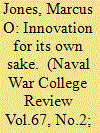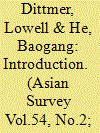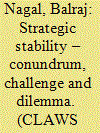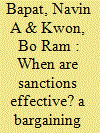|
|
|
Sort Order |
|
|
|
Items / Page
|
|
|
|
|
|
|
| Srl | Item |
| 1 |
ID:
133073


|
|
|
|
|
| Publication |
2014.
|
| Summary/Abstract |
The origins of this article lie in a new study of the Nazi German economy by Adam Tooze, a fragment of which argues that the need to overcome the technological deficit built by the Western Allies in antisubmarine warfare from 1939 triggered a major shift in U-boat design and production after 1943.1 Tooze points out that an emphasis on technological solutions to strategic and operational problems had by that point become a hallmark of the Nazis', and especially Hitler's, thinking. (Other examples were the Tiger and Panther tanks at Kursk, both of which types proved dysfunctional as platforms, and neither of which proved decisive to the outcome.) So interpreted, the Nazi penchant for imputing to innovation the means to solve a whole class of operational and strategic problems seems to resemble "technological fixes" in other fields of innovation.2 In so arguing Tooze writes off the findings of Richard Overy, who points to the failure of the regime to develop positive relationships between industry and the war effort as reflecting a "peculiar irrationality of the 'Nazi social system.'" Tooze highlights the research of Ralf Schabel on jet-engine development in the aircraft industry, research asserting that exaggerated technological expectations resulted from Germany's hopeless strategic dilemma and that the systems themselves, while quite promising, were rushed into mass production and combat without adequate testing or development. Interestingly, he then characterizes Admiral Karl Dönitz's decision to embrace the Type XXI submarine in 1943, under the technocratic direction of Albert Speer's ministry, as reflecting both the increasing unreality of German armaments propaganda and a progressively more authoritarian cast of the German war economy.
|
|
|
|
|
|
|
|
|
|
|
|
|
|
|
|
| 2 |
ID:
130162


|
|
|
|
|
| Publication |
2014.
|
| Summary/Abstract |
IN THE PAST 20 YEARS, CHINA HAS RISEN to become the second largest economic power in the world. Its GDP surpassed that of Canada in 1993, Italy in 2000, France in 2005, the U.K. in 2006, Germany in 2008, and Japan in 2009. In 2012 it surpassed the United States as the world's largest trading nation (the U.S. remains the largest importer). China is now the number one trading partner of Australia, Japan, South Korea, and the ?rst or second trading partner of the 10 nations in the Association of Southeast Asian Nations (ASEAN), not counting the EU. Growing economic dependence upon China, however, raises long-term security issues for all Asian trade partners, given their strategic proximity to ambitious China. This is also true for Australia, just 200 kilometers from Indonesia at their closest points. Canberra, unable to shore up a security guarantee from Beijing, has increased its purchase in the security insurance policies of Washington.
|
|
|
|
|
|
|
|
|
|
|
|
|
|
|
|
| 3 |
ID:
143680


|
|
|
|
|
| Summary/Abstract |
The bargaining for a new role in world politics presents a rising power with a strategic dilemma, as the new role entails a new power position in the system and a new social status in international society. China’s assertiveness in diplomacy after 2008 can be seen as a ‘role bargaining’ process between China and the outside world, such as China’s bargaining for a new role in the global financial system through the Asian Infrastructure Investment Bank (AIIB). This article aims to examine how a rising power can bargain for the new role in a peaceful way. Based on rational bargaining theory and on role theory, we suggest four strategies whereby a rising power bargains for a new role: costly signalling, self-restraint, role-diversification, and alter-casting. Through focusing on China’s World Trade Organization accession and integration into the global economy after the Cold War, we examine the utilities and limitations of these four role-bargaining strategies for a rising power in the international system. The first two strategies aim to address the information and commitment problems concomitant with rationalism that a rising power faces in negotiating a new power position, and the last two strategies focus on how a rising power can bargain for a new social role by balancing the self’s role conception and the role expectations of others.
|
|
|
|
|
|
|
|
|
|
|
|
|
|
|
|
| 4 |
ID:
138788


|
|
|
|
|
| Summary/Abstract |
Strategy is a much debated notion, and there are some who doubt whether it is possible or desirable to have a coherent, grand strategy, or even a central strategic concept such as ‘containment’, in today’s global environment. The literature on strategic thought has grown even as the challenges to intellectual coherence have multiplied.
|
|
|
|
|
|
|
|
|
|
|
|
|
|
|
|
| 5 |
ID:
075841


|
|
|
| 6 |
ID:
139168


|
|
|
|
|
| Summary/Abstract |
The strategic environment in South Asia and Northeast Asia has four nuclear weapon states, of which three (China, India and Pakistan) share problems by facts of geography, history, and ideological and power competition. China seeks to determine the contours and shape of future events in the region, with its economic and military power most likely to influence the region. India looks at economic growth based on its core values and security, and a peaceful environment, to assume its rightful place
in the comity of nations. Pakistan, a revisionist state, and now a haven and nursery for terrorists, is in competition to emerge as a dominant power in the region and continues to follow policies to destabilise the region, even at the cost of hurting its own long-term national interest. Besides the direct dynamics, external influences impact the states in different ways, and all combined, these determine the strategic stability environment.
|
|
|
|
|
|
|
|
|
|
|
|
|
|
|
|
| 7 |
ID:
139791


|
|
|
|
|
| Summary/Abstract |
Although a considerable literature identifies the conditions under which sanctions are more likely to be successful, few studies examine the question of when sanctioning states or senders are willing to enforce their sanctions laws against their firms. Using a game theoretic model, we argue that imposing sanctions creates a strategic dilemma for senders. We demonstrate that senders often have disincentives to enforce their sanctions policies, given that the restriction on economic transactions with targeted states may undermine their firms' competitiveness. The model indicates that sanctions are more likely to succeed when the sender's firm retains a moderate share of the target's market relative to its foreign competitors. However, the model also demonstrates that sanctions are likely to be imposed only when the conditions do not favor their success. The empirical implications of the model are tested using the Threat and Imposition of Economic Sanctions (TIES) data set.
|
|
|
|
|
|
|
|
|
|
|
|
|
|
|
|
|
|
|
|
|